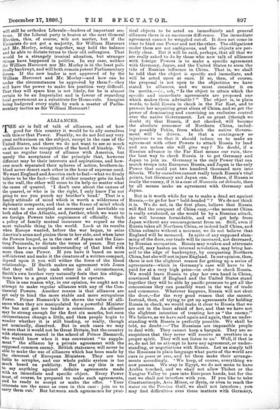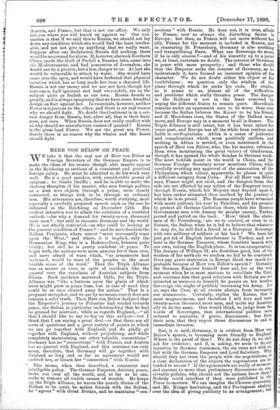ALLIANCES. T HE air is full of talk of alliances, and
of how good for this country it would be to ally ourselves with this or that Power. Frankly, we do not feel any very great enthusiasm on the subject, except in the case of the United States, and there we do not want to see so much an alliance as the recognition of the bond of kinship. We want no regular treaty of alliance with America, but merely the acceptance of the principle that, however different may be their interests and aspirations, and how- ever much separated their spheres of action, brothers-in- blood never desert each other in the hour of supreme need. We want England andAmerica each to feel—what we firmly believe to be the fact—that if either country gets its back to the wall, the other will come to its help no matter what the cause of quarrel. I don't care about the causes of the quarrel, or who is in the right, I only know I'm not going to see you punch my brother's head.' That is a family attitude of mind which is worth a wilderness of diplomatic compacts, and that is the frame of mind which we want to see accepted as necessary and inevitable on both sides of the Atlantic, and, further, which we want to see foreign Powers take cognisance of officially. Such a policy of family mutual insurance we regard as the most valuable thing in the world. Look at its results when Europe wanted, before the war began, to seize America's arms and pinion them to her side, and when later the Powers longed, as in the case of Japan and the Liao- tung Peninsula, to dictate the terms of peace. But you cannot have a mutual understanding of that kind with more than one Power. If you have it based on mere self-interest and make it the creature of a written compact, depend upon it you will wither the force of the blood relationship. If Smith makes an agreement with Jones that they will help each other in all circumstances, Smith's own brother very naturally feels that his obliga- tions have to a great extent ceased to operate. This is one reason why, in our opinion, we ought not to attempt to make regular alliances with any of the Con- tinental Powers. Another reason is that alliances are apt only to bind the more stable and more scrupulous Power. Prince Bismarck's life shows the value of alli- ances when they are manipulated by a powerful Minister who has not got too tender a, conscience. An alliance may be strong enough for the first six months, but soon circumstances change a little, and then people begin to wonder whether it is still binding, or really, though not nominally, dissolved. But in such cases we may be sure that it would not be Great Britain, but the country with statesmen reared in the school of Prince Bismarck, who would know when it was convenient " to supple- ment " the alliance by a private agreement with the supposed common enemy. British statesmen will never be able to make the use of alliances which has been made by the cleverest of European Ministers. They are too liable to scruples, and our whole public system is too much based on publicity. But to say this is not to say anything against definite agreements made with an immediate and specific object. Every Power must, of course, be prepared to make such agreements, and be ready to accept or make the offer. Your Interests are the same as ours in this case : join us to carry them out.' But between such agreements for prac- tical objects to be acted on immediately and genera/ alliances there is an enormous difference. The immediate agreement cannot be wriggled out of. It does not come in time to bind one Power and not the other. The obligations under them are not ambiguous, and the objects are per- fectly clear. But it will be said, perhaps, that all that we are really asked to do by those who now talk of alliances with foreign Powers is to make a specific agreement with Germany, Japan, and the United States to stem the tide of Russian influence in China. That is. we shall be told that the object is specific and immediate, and will be acted upon at once. If so, then, of course, the proposal is not open to the objections we have stated to alliances, and we must consider it on its merits,—i.e., ask, "Is the object to attain which the specific and immediate agreements are proposed one which makes them advisable ? " The object is, in plain words, to hold Russia in check in the Far East, and to prevent her acquiring great slices of China, and so get the power of dominating and exercising an exclusive control over the native Government. Let us grant (though we doubt it) that Russia, if not checked, will become the absolute possessor of Northern China, includ- ing possibly Pekin, from which the native Govern- ment will be driven. Is that a contingency so injurious to us that it should induce us to make an agreement with other Powers to attack Russia by land and sea unless she will give way ? No doubt, if a. Russian advance in the Far East means our ruin, then the best way to check Russia is to get Germany and Japan to join us. Germany is the only Power that can march troops into European Russia, and Japan is the only Power that could put two hundred thousand men into Siberia. We by ourselves cannot really touch Russia's vital points, but Germany and Japan can. Hence, if Russia is really the enemy, if it is a case of Moseovia est delenda, then by all means make an agreement with Germany and Japan.
But is it worth while for us to make a dead set against Russia,—to go for her " bald-headed " ? We do not think it is. We do not, in the first place, believe that Russia. will find the conquest of China easy,—the moment China. is really awakened, as she would be by a Russian attack, she will become formidable, and will get help from Japan without any encouragement from us. Still, even if Russia takes all Northern China, or indeed half China, and China submits without a murmur, we do not believe that England will be menaced. In spite of any supposed slam- ming of the door, our trade will be increased, not decreased, by Russian occupation. Russia may weaken and attenuate herself, may hasten an internal revolution, may bring her- self to the edge of bankruptcy, by conquering Northern China, but she will not injure England. In our opinion, then, there is not the slightest reason for getting up a series of agreements—which in Germany's case will have to be paid for at a very high price—in order to check Russia. We would leave Russia to play her own hand in China, convinced that if England and the United States stand together they will be able by pacific pressure to get all the concessions they can possibly want in the way of trade, and commerce. Whatever happens, Russia will not shut the door,—for the very good reason that she cannot. Instead, then, of trying to get up agreements for holding. Russia in check, we would make it clear to Russia that we are not in the least afraid of her, and that we have not the slightest intention of treating her as " the enemy." We believe, as we have said again and again, that an under- standing with Russia is perfectly possible. We shall be told, no doubt The Russians are impossible people to deal with. They cannot keep a bargain. They are so. suspicious that they never will receive an overture in a. proper spirit. They will not listen to us.' Well, if that is so, do not let us attempt to have any agreement, or under- standing, or negotiations with Russia. Let us simply tell the Russians in plain language what parts of the world are ours in posse or ease, and let them make their arrange- ments accordingly. We keep, of course, everything we now possess. We stay in Egypt, we do not mean to have Arabia touched, and we shall not allow Thibet or the Yangtse Valley to pass into Eurcpean hands, but for the rest we shall not interfere with you. If you like to take Constantinople, Asia Minor, or Syria, or even to reach the' water on the Persian Gulf, we shall not interfere ; yen, may find difficulties oyes these matters with Germany, Austria, and France, but that is not our affair. We only tell you where you will knock up against us.' Our con- tention is that if we said this to Russia, we should not lay down any condition which she would find the least intoler- able, and yet not give up anything that we really want. Suppose after our declaration Russia did nothing, there would be no ground for alarm. If, however, she took Northern China, made the Gulf of Pechili a Russian lake, came into the Mediterranean, and had possession of Jerusalem, she would not be a greater, but a less, danger to us. At last she would be vulnerable to attack by water. She would have come into the open, and would have forfeited that physical isolation which has so long made her bear a charmed life. Russia is not our enemy and we are not hers, though her statesmen, half ignorant and half over-subtle, are on the subject quite as foolish as our own. Russia dreads us greatly, and is always imagining that we have some dreadful design on foot against her. In essentials, however, neither Power is injurious to the other, and there is no real reason why we should fight. No doubt the Continent is in a cer- tain danger from Russia, but, after all, that is their busi- ness, not ours. When Russia does not really conflict with us why should we manufacture causes of quarrel ? Russia is the great land Power. We are the great sea Power. Surely there is no reason why the whales and the bears should fight.











































 Previous page
Previous page